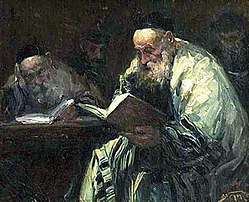Isaiah in rabbinic literature
Allusions in rabbinic literature to the Biblical prophet Isaiah contain various expansions, elaborations and inferences that go beyond what is presented in the text of the Bible itself.
| Rabbinic literature | ||||||||||||
|---|---|---|---|---|---|---|---|---|---|---|---|---|
 Talmud Readers by Adolf Behrman | ||||||||||||
| Talmudic literature | ||||||||||||
|
||||||||||||
| Halakhic Midrash | ||||||||||||
|
||||||||||||
| Aggadic Midrash | ||||||||||||
|
||||||||||||
| Targum | ||||||||||||
|
||||||||||||
Ancestry
According to the ancient rabbis, Isaiah was a descendant of Judah and Tamar.[1] His father was a prophet and the brother of King Amaziah.[2]
His choice as prophet
While Isaiah, says the Midrash, was walking up and down in his study he heard God saying, "Whom shall I send?" Then Isaiah said, "Here am I; send me!" Thereupon God said to him," My children are trouble-some and sensitive; if you are ready to be insulted and even beaten by them, you may accept My message; if not, you would better renounce it".[3] Isaiah accepted the mission, and was the most forbearing, as well as the most patriotic, among the prophets, always defending Israel and imploring forgiveness for its sins. When Isaiah said, "I dwell in the midst of a people of unclean lips",[4] he was rebuked by God for speaking in such terms of His people.[5]
His death
It is related in the Talmud that Rabbi Simeon ben Azzai found in Jerusalem an account wherein it was written that King Manasseh killed Isaiah. King Manasseh said to Isaiah, "Moses, your master, said, 'No man may see God and live'[6]; but you have said, 'I saw the Lord seated upon his throne'"[7]; and went on to point out other contradictions—as between Deuteronomy 4:7 and Isaiah 40:6; between Exodus 33:23 and 2 Kings 20:6. Isaiah thought: "I know that he will not accept my explanations; why should I increase his guilt?" He then uttered the tetragrammaton, a cedar-tree opened, and Isaiah disappeared within it. King Manasseh ordered the cedar to be sawn asunder, and when the saw reached his mouth Isaiah died; thus was he punished for having said, "I dwell in the midst of a people of unclean lips".[8]
A somewhat different version of this legend is given in the Jerusalem Talmud.[9] According to that version Isaiah, fearing King Manasseh, hid himself in a cedar-tree, but his presence was betrayed by the fringes of his garment, and King Manasseh caused the tree to be sawn in half. A passage of the Targum to Isaiah quoted by Jolowicz[10] states that when Isaiah fled from his pursuers and took refuge in the tree, and the tree was sawn in half, the prophet's blood spurted forth. The legend of Isaiah's martyrdom spread from Talmudic circles to the Arabs.[11]
According to rabbinic literature, Isaiah was the maternal grandfather of Manasseh of Judah.[12]
Notes
- Sotah 10b
- Talmud tractate Megillah 15a
- Leviticus Rabbah 10
- Isaiah 6:5
- Shir haShirim Rabbah 1:6
- Exodus 33:20
- Isaiah 6:1
- Yevamot 49b
- Yerushalmi, Sanhedrin 10
- "Die Himmelfahrt und Vision des Prophets Jesajas," p. 8
- "Ta'rikh," ed. De Goeje, i. 644
- ""Hezekiah". Jewish Encyclopedia". www.jewishencyclopedia.com. 1906.
![]()